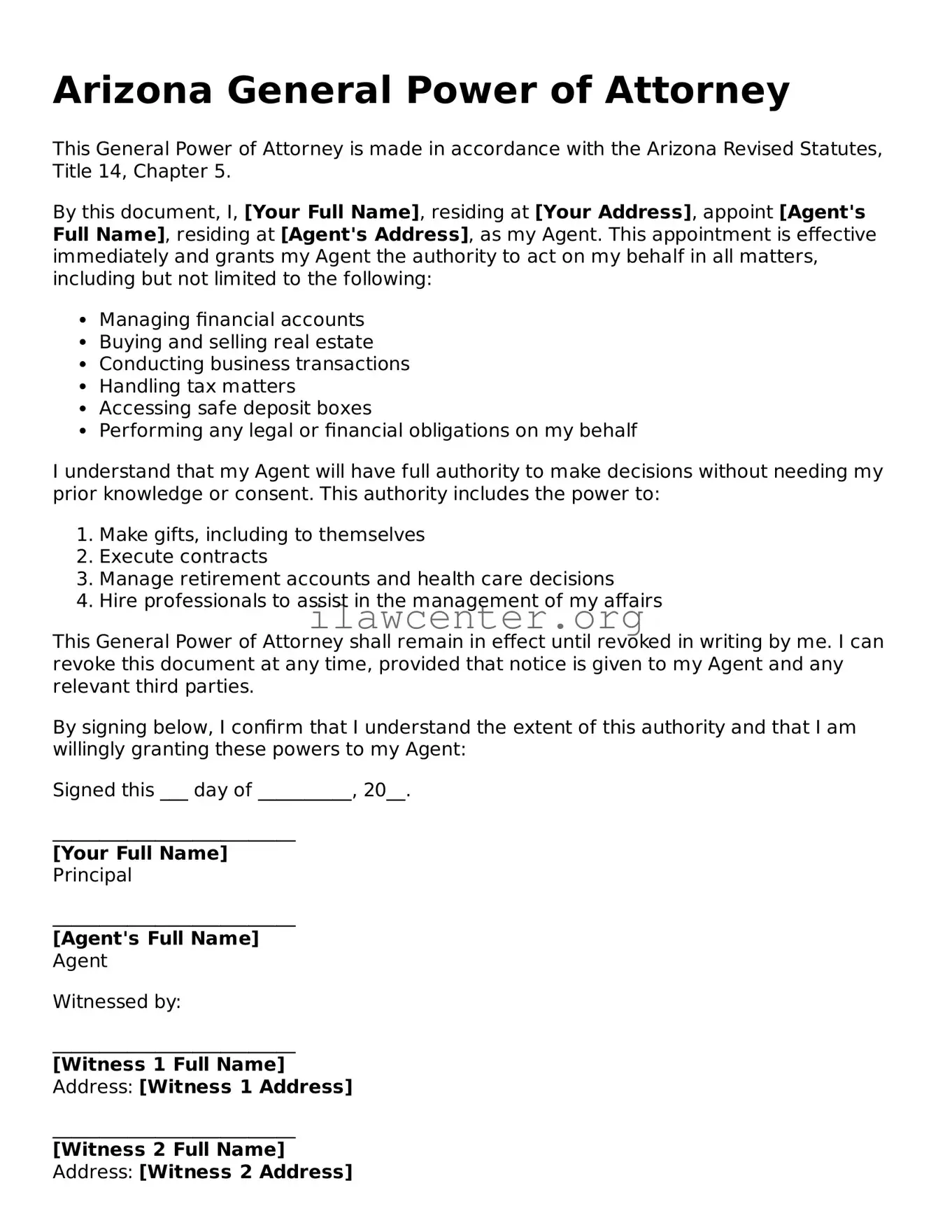What is a General Power of Attorney in Arizona?
A General Power of Attorney is a legal document that allows one person, known as the principal, to grant authority to another person, called the agent, to handle various financial and legal matters on their behalf. This can include tasks like managing bank accounts, signing contracts, and making decisions regarding property. The document provides flexibility and security, especially for individuals who may become incapacitated or unable to manage their affairs due to illness or absence.
Who can be appointed as an agent under a General Power of Attorney?
The agent can be anyone the principal trusts to handle their affairs. This could be a family member, a close friend, or a professional advisor like an attorney. However, the agent must be at least 18 years old and mentally competent to agree to the responsibilities assigned to them. It is essential that the chosen agent is trustworthy and capable of acting in the best interest of the principal.
When does a General Power of Attorney take effect in Arizona?
A General Power of Attorney typically takes effect immediately upon signing. However, the principal can specify that the authority granted to the agent begins at a later date or under certain conditions, such as the principal becoming incapacitated. This is known as a "springing" power of attorney, which allows the document to become active only when specific circumstances arise.
Can I revoke a General Power of Attorney once it is in effect?
Yes, a principal can revoke a General Power of Attorney at any time, as long as they are mentally competent. This process usually involves creating a written notice of revocation and providing a copy to the agent, as well as any third parties who may be relying on the previous authority. It is advisable to also destroy any copies of the original document to eliminate confusion.
Are there any alternatives to a General Power of Attorney?
Yes, alternatives include a Durable Power of Attorney and a Limited Power of Attorney. A Durable Power of Attorney remains effective even if the principal becomes incapacitated, while a Limited Power of Attorney allows the agent to act only within a specific scope or for a certain period. Choosing the right type of power of attorney depends on individual needs and circumstances.
What are the responsibilities of an agent under a General Power of Attorney?
An agent is responsible for managing the principal’s affairs in a manner that reflects the best interests of the principal. This includes keeping accurate records of transactions, acting within the scope of authority granted by the power of attorney, and avoiding any conflicts of interest. The agent must also act in good faith and take any necessary steps to maintain the principal’s financial well-being.
Do I need to have a lawyer to create a General Power of Attorney?
While it is not legally required to have a lawyer draft your General Power of Attorney, consulting with a legal professional is highly recommended. A lawyer can help ensure the document is properly prepared and complies with Arizona laws. Additionally, they can provide valuable insights on selecting an appropriate agent and addressing any specific needs or concerns.
What happens if an agent exceeds their authority?
If an agent exceeds the authority granted to them by the General Power of Attorney, they may be held liable for any resulting damages. The principal or any interested party can take legal action against the agent for breach of fiduciary duty. It is crucial for both the principal and agent to have a clear understanding of the powers being granted to avoid potential conflicts and disputes.
How long does a General Power of Attorney last?
A General Power of Attorney remains in effect until it is revoked by the principal, the principal passes away, or the agent resigns or becomes unable to serve. If the power of attorney includes specific termination conditions or specifies an expiration date, then the document is valid only until those conditions are met or the date arrives.
Can a General Power of Attorney be used to make medical decisions?
No, a General Power of Attorney is primarily focused on financial and legal matters. If you want someone to make medical decisions on your behalf, you will need a separate document called a Healthcare Power of Attorney or Medical Power of Attorney. This document specifically grants authority to an agent to make healthcare decisions if you are unable to do so.
